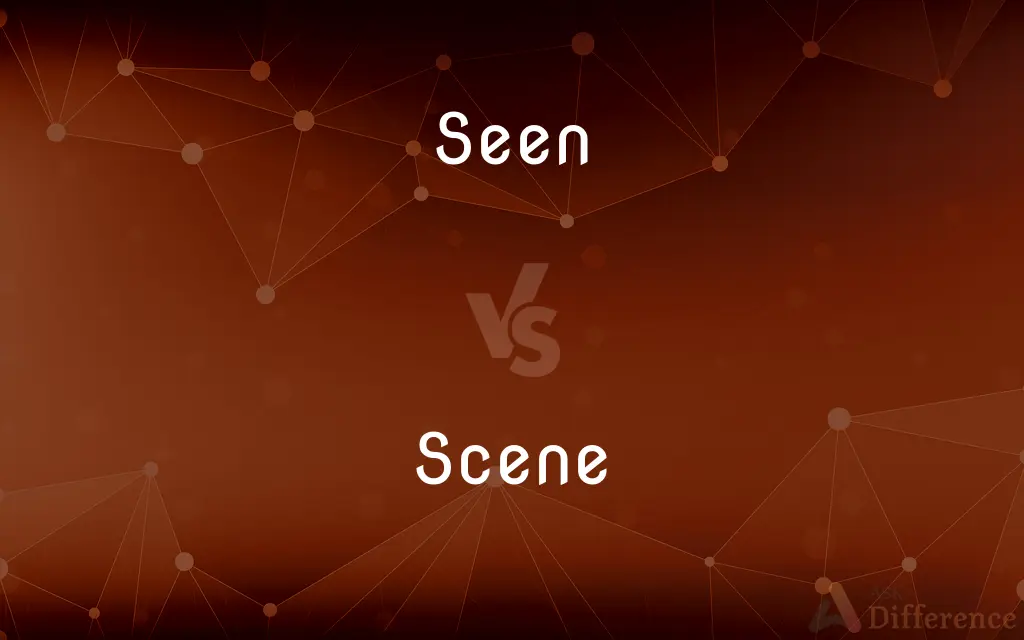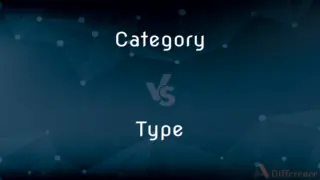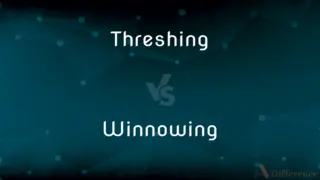Seen vs. Scene — What's the Difference?
By Tayyaba Rehman & Urooj Arif — Updated on March 29, 2024
Seen is the past participle of "see," referring to the act of perceiving with the eyes; scene refers to a place where an event occurs or is depicted, often used in the context of plays, movies, or books.

Difference Between Seen and Scene
Table of Contents
ADVERTISEMENT
Key Differences
Seen is directly related to the sense of sight and is used to describe having visually perceived something in the past. It is the past participle of the verb "see," indicating the completion of the action of seeing. For example, when someone says, "I have seen the movie," it means that the person has watched the movie at some point in the past. On the other hand, scene pertains to a specific location or setting where events unfold. In the context of literature, drama, or film, a scene is a segment that presents a continuous action in one setting. The term can also refer to real-life scenarios, describing the place where an incident occurred, like "the scene of the accident."
While "seen" is focused on the experience of observation and is always linked to the observer's perception, "scene" is concerned with the spatial and narrative aspects of an event or story. A "scene" sets the stage for action and dialogue, creating a backdrop that contributes to the narrative's mood, theme, and progression.
The application of "seen" is tied to personal experiences and observations, highlighting an individual's encounter or engagement with something. In contrast, "scene" can evoke a shared or collective experience, as it refers to a common space or narrative element that multiple observers or characters interact with.
Understanding the difference between "seen" and "scene" is crucial in communication to avoid confusion, especially in contexts where both visual perception and narrative or spatial elements are discussed. "Seen" encapsulates a personal visual experience, whereas "scene" captures the essence of a setting or a narrative segment, whether in artistic works or in real life.
In essence, while "seen" and "scene" might sound similar, they serve distinct linguistic functions. "Seen" deals with the act of visual perception from an individual's viewpoint, and "scene" describes the physical or narrative environment where events occur, offering a rich tapestry of settings in storytelling and real-life descriptions.
ADVERTISEMENT
Comparison Chart
Part of Speech
Verb (past participle of "see")
Noun
Definition
Refers to having visually perceived something.
Refers to a location or setting of an event.
Context
Personal visual experience or observation.
Artistic works (plays, movies, books) or real-life settings.
Usage
"I have seen that film."
"The opening scene of the movie was breathtaking."
Function
Highlights completion of the act of seeing.
Describes the spatial or narrative backdrop for events.
Compare with Definitions
Seen
Past participle of "see," indicating visual perception.
He had seen the error in his calculations.
Scene
A specific location or setting in a narrative.
The beach scene was beautifully described.
Seen
Conveys the act of watching or noticing.
She had seen the warning signs.
Scene
A segment of continuous action in drama or film.
That scene from the play was very moving.
Seen
Used to express experiences or observations.
I've seen better days.
Scene
The place where an incident in real life occurs.
Police cordoned off the crime scene.
Seen
Implies awareness or knowledge through sight.
They've seen the effects of the policy.
Scene
A picturesque or striking view.
The sunset created a perfect scene by the lake.
Seen
Describes encountering or experiencing visually.
We've seen the masterpiece in the museum.
Scene
A social environment or context.
He's well-known in the local music scene.
Seen
Past participle of see1.
Scene
Something seen by a viewer; a view or prospect.
Seen
Past participle of see
Scene
The place where an action or event occurs
The scene of the crime.
Seen
; saw.
I seen it with my own eyes.
Scene
The place in which the action of a play, movie, novel, or other narrative occurs; a setting.
Seen
(Jamaica) To understand, to comprehend.
Everything irie, seen?
Scene
A subdivision of an act in a dramatic presentation in which the setting is fixed and the time continuous.
Seen
The letter س in the Arabic script.
Scene
A shot or series of shots in a movie constituting a unit of continuous related action.
Seen
Versed; skilled; accomplished.
Well seen in every science that mote be.
Noble Boyle, not less in nature seen,Than his great brother read in states and men.
Scene
A section of a narrative in which the action is depicted through detail and dialogue as if it is occurring in real time
The editor felt the story had too much summary and suggested that the author add more scenes.
Scene
The scenery and properties for a dramatic presentation.
Scene
A theater stage.
Scene
A real or fictitious episode, especially when described.
Scene
A public display of passion or temper
Tried not to make a scene.
Scene
A sphere of activity
Observers of the political scene.
Scene
(Slang) A situation or set of circumstances
A bad scene.
A wild scene.
Scene
The location of an event that attracts attention.
The scene of the crime
Scene
The stage.
They stood in the centre of the scene.
Scene
(theatre) The decorations; furnishings and backgrounds of a stage, representing the place in which the action of a play is set
To paint scenes
To change the scenes
Behind the scenes
Scene
A part of a dramatic work that is set in the same place or time. In the theatre, generally a number of scenes constitute an act.
The play is divided into three acts, and in total twenty-five scenes.
The most moving scene is the final one, where he realizes he has wasted his whole life.
There were some very erotic scenes in the movie, although it was not classified as pornography.
Scene
The location, time, circumstances, etc., in which something occurs, or in which the action of a story, play, or the like, is set up
Scene
A combination of objects or events in view or happening at a given moment at a particular place.
He assessed the scene to check for any danger, and agreed it was safe.
They saw an angry scene outside the pub.
Scene
A landscape, or part of a landscape; scenery.
Scene
An exhibition of passionate or strong feeling before others, creating embarrassment or disruption; often, an artificial or affected action, or course of action, done for effect; a theatrical display
The headmistress told the students not to cause a scene.
The crazy lady made a scene in the grocery store.
Scene
An element of fiction writing.
Scene
A social environment consisting of an informal, vague group of people with a uniting interest; their sphere of activity; a subculture.
She got into the emo scene at an early age.
Scene
A youth subculture that was popular in Canada and the United States in the 2000s and early 2010s.
Scene
(transitive) To exhibit as a scene; to make a scene of; to display.
Scene
The structure on which a spectacle or play is exhibited; the part of a theater in which the acting is done, with its adjuncts and decorations; the stage.
Scene
The decorations and fittings of a stage, representing the place in which the action is supposed to go on; one of the slides, or other devices, used to give an appearance of reality to the action of a play; as, to paint scenes; to shift the scenes; to go behind the scenes.
Scene
So much of a play as passes without change of locality or time, or important change of character; hence, a subdivision of an act; a separate portion of a play, subordinate to the act, but differently determined in different plays; as, an act of four scenes.
My dismal scene I needs must act alone.
Scene
The place, time, circumstance, etc., in which anything occurs, or in which the action of a story, play, or the like, is laid; surroundings amid which anything is set before the imagination; place of occurrence, exhibition, or action.
The world is a vast scene of strife.
Scene
An assemblage of objects presented to the view at once; a series of actions and events exhibited in their connection; a spectacle; a show; an exhibition; a view.
Through what new scenes and changes must we pass!
Scene
A landscape, or part of a landscape; scenery.
A sylvan scene with various greens was drawn,Shades on the sides, and in the midst a lawn.
Scene
An exhibition of passionate or strong feeling before others; often, an artifical or affected action, or course of action, done for effect; a theatrical display.
Probably no lover of scenes would have had very long to wait for some explosions between parties, both equally ready to take offense, and careless of giving it.
Scene
To exhibit as a scene; to make a scene of; to display.
Scene
The place where some action occurs;
The police returned to the scene of the crime
Scene
An incident (real or imaginary);
Their parting was a sad scene
Scene
The visual percept of a region;
The most desirable feature of the park are the beautiful views
Scene
A consecutive series of pictures that constitutes a unit of action in a film
Scene
A situation treated as an observable object;
The political picture is favorable
The religious scene in England has changed in the last century
Scene
A subdivision of an act of a play;
The first act has three scenes
Scene
A display of bad temper;
He had a fit
She threw a tantrum
He made a scene
Scene
Graphic art consisting of the graphic or photographic representation of a visual percept;
He painted scenes from everyday life
Figure 2 shows photographic and schematic views of the equipment
Scene
The context and environment in which something is set;
The perfect setting for a ghost story
Scene
The painted structures of a stage set that are intended to suggest a particular locale;
They worked all night painting the scenery
Common Curiosities
How is "scene" used in a sentence?
"Scene" is used to denote a specific place where something happens, or a segment of a play, movie, or narrative.
Can "seen" and "scene" be used interchangeably?
No, they cannot. "Seen" refers to the act of seeing, while "scene" refers to a physical or narrative setting.
Is "scene" only used in artistic contexts?
While often used in artistic contexts, "scene" can also refer to real-life locations, especially where specific events have occurred.
What does "seen" mean?
"Seen" is the past participle of "see," used to describe something that has been looked at or observed in the past.
What role does "seen" play in describing experiences?
"Seen" highlights an individual's visual observation or encounter with something, underscoring personal awareness or knowledge.
How does context affect the use of "seen" and "scene"?
Context determines their usage: "seen" is about visual perception and experiences, and "scene" relates to locations, settings, or segments of action.
What's the difference between "I've seen" and "a scene"?
"I've seen" expresses a personal experience of seeing something, while "a scene" describes a specific location or part of a narrative.
How do "seen" and "scene" contribute to language and communication?
They enrich language by offering nuanced ways to describe visual experiences ("seen") and settings or narrative elements ("scene").
Can the meaning of "scene" vary?
Yes, "scene" can refer to a part of a narrative, a real-life location, a social milieu, or even a picturesque view.
Why is it important to distinguish between "seen" and "scene"?
Understanding their differences is crucial for clear communication, especially in narratives, descriptions, and sharing experiences.
Share Your Discovery

Previous Comparison
Category vs. Type
Next Comparison
Threshing vs. WinnowingAuthor Spotlight
Written by
Tayyaba RehmanTayyaba Rehman is a distinguished writer, currently serving as a primary contributor to askdifference.com. As a researcher in semantics and etymology, Tayyaba's passion for the complexity of languages and their distinctions has found a perfect home on the platform. Tayyaba delves into the intricacies of language, distinguishing between commonly confused words and phrases, thereby providing clarity for readers worldwide.
Co-written by
Urooj ArifUrooj is a skilled content writer at Ask Difference, known for her exceptional ability to simplify complex topics into engaging and informative content. With a passion for research and a flair for clear, concise writing, she consistently delivers articles that resonate with our diverse audience.














































